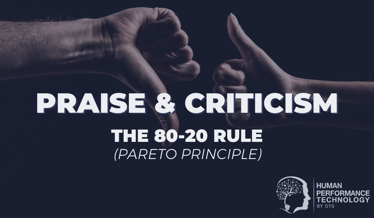In a Nutshell: Strengths-Based Thinking (Strengths Movement)
The origins of writings that explore the importance of strengths go back many decades. One of the earliest and most notable was Peter Drucker who said, "A person can perform only from strength. One cannot build performance on weakness, let alone on something one cannot do at all."
The British-American researcher, consultant and author Marcus Buckingham continued with this theme and helped launch what he terms the “strengths revolution” into mainstream business. The “strengths movement,” as it is also commonly referred to, has several books at its core but officially began with the publication of “Now, Discover Your Strengths” (2001), which Buckingham coauthored with Donald O. Clifton. While Buckingham had already begun writing about the importance of strengths in his 1999 debut bestseller, “First, Break All the Rules,” it was the 2001 follow-up book that explored the concept more completely.
What sets “Now, Discover Your Strengths” apart from other books that have touched on the same idea in the past is that Buckingham’s work is based on very rigorous data collection and analysis. Trained as a statistician, Buckingham has spent nearly 20 years as a senior researcher at the Gallup Organisation studying the world's best managers and companies to discover what drives high performance in teams.
Buckingham has continued to promote strengths-based thinking with several other bestsellers including “Go Put Your Strengths to Work” (2007), “The Truth About You” (2008) and “Stand Out” (2011). His appearance on the Oprah Winfrey Show helped disseminate many of his ideas to the wider public. He also strongly advocates for more emphasis on strengths in schooling and education.
Strengths-based thinking shares close parallels with the positive psychology movement and Appreciative Inquiry.
Overview:
Strengths-based thinking is a philosophy that might be summarised as follows:
- It's better to focus on building people's strengths than trying to fix their weaknesses
- People can only perform at their best when they are in a role suited to their strengths
- Strengths are those things that we are good at doing and enjoy, not things we are good at doing but don’t enjoy
- Recruit, develop and manage people around their strengths to build an excellent organisation.
Gallup defines a strength as "the ability to consistently provide near-perfect performance in a specific activity. The key to building a strength is to identify your dominant talents, then complement them by acquiring knowledge and skills pertinent to the activity."
According to Buckingham, “the best managers seem to understand that you get the best return from investing in, coaching around, and focusing on an individual’s strengths. So this isn’t my theory. It’s not a theory that’s been developed by a particular academic. It’s a practical theory derived from studying what the best managers do. Frankly, it’s also what the best teachers do. You could even argue it’s what the best parents do.”
As part of the research conducted through Gallup, Buckingham had access to performance data from thousands of teams all over the world. He found enormous variance in performance even with teams that worked within the same organisation. In making the case for the importance of strengths, Buckingham found that "there is one question which predicts most effectively and most consistently whether you’ll be on a high performance team or a low performance team: At work, do you have an opportunity to do what you do best every day?”
In other words, when people have the opportunity to apply their strengths every day, they are found to be highly engaged and productive. On the flip side, when people are recruited in roles that don’t match their strengths or when they are managed in a way that requires them to draw on their weaknesses on a daily basis, disengagement, staff turnover and a host of negative results follow as a natural consequence.
Buckingham acknowledges that everyone will need to manage tasks that they are not good at to some extent. His advice is not saying “ignore your weaknesses.” On this point, Buckingham says: “There’s nothing wrong with dealing with what you’re bad at, or what you have a weakness in. The whole point of the strengths approach is that it’s not the way that you’re going to win. You’re going to win by finding where you have some kind of comparative advantage and figuring out a way to leverage that.”
In “Now, Discover Your Strengths,” the authors say that three things combine to create a strength: talents, knowledge and skills. They include a tool called StrengthsFinder Profile, which is a self-assessment tool designed to help people discover their ingrained talents from a list of 34 patterns or “themes,” stating: “These 34 are the most prevalent themes of human talent.” (Marcus lists his top 5 as: Futuristic, Context, Focus, Ideation, Intellection).
Sources:
- Now, Discover Your Strengths (2001), Marcus Buckingham and Donald O. Clifton
- First, Break All the Rules: What the World's Greatest Managers Do Differently (1999), Marcus Buckingham and Curt Coffman
- The Marcus Buckingham Company (TMBC.com)
- Gallup Business Journal (Businessjournal.gallup.com)
- Strengths (Gallup) - (Strengths.gallup.com)
- Strengths Finder (Strengthsfinder.com)
- The 50 Most Influential Management Gurus, Harvard Business, 2011
- What Great Managers Do, HBR, Marcus Buckingham, 2005
- The Drucker Institute, Marcus Buckingham on “Drucker on the Dial”
- Strengths-Based Development in Practice, Timothy Hodges, Donald Clifton, 2012
- Rethinking Strengths-Based Development, AM Azure, 2010
- Coaching Positively: Lessons For Coaches From Positive Psychology (2011), Matt Driver
This article offers an expanded description of the summary listed in our post 40 Must-Know HR, OD, L&D Models.

Theo Winter
Client Services Manager, Writer & Researcher. Theo is one of the youngest professionals in the world to earn an accreditation in TTI Success Insight's suite of psychometric assessments. For more than a decade, he worked with hundreds of HR, L&D and OD professionals and consultants to improve engagement, performance and emotional intelligence of leaders and their teams. He authored the book "40 Must-Know Business Models for People Leaders."



We Would Like to Hear From You (0 Comments)